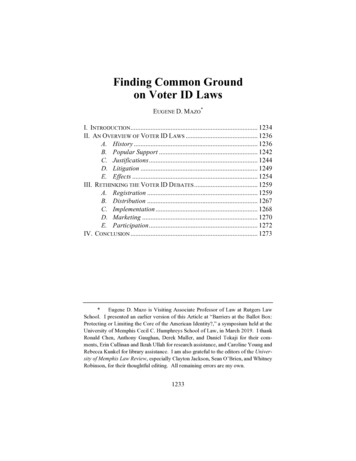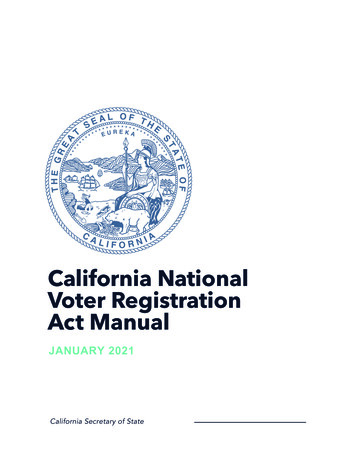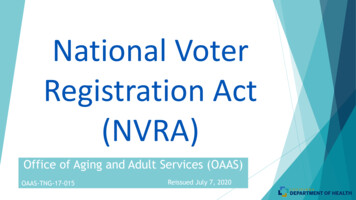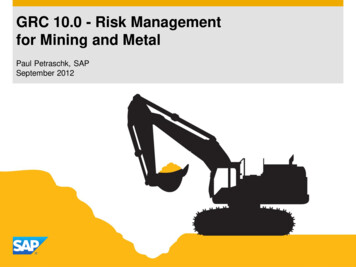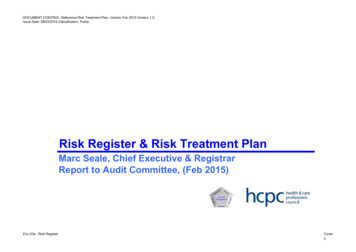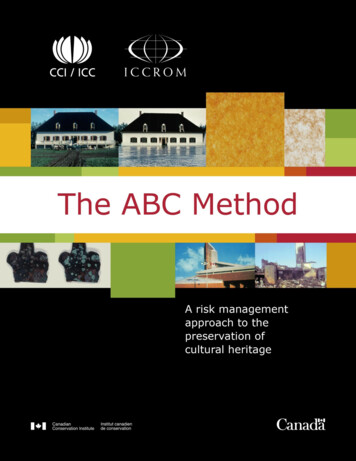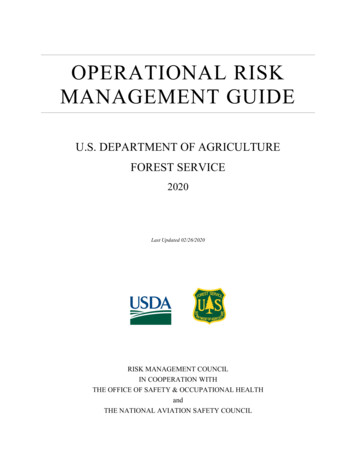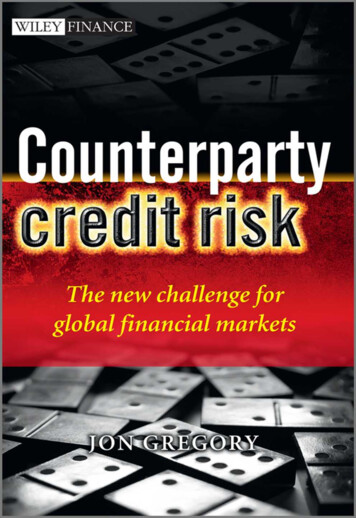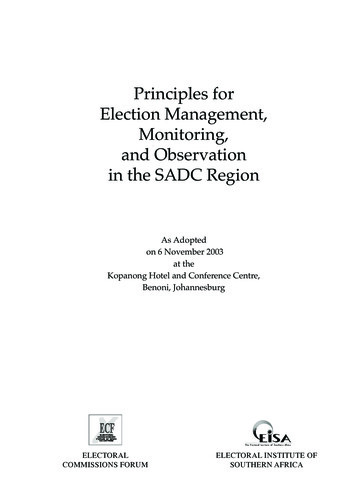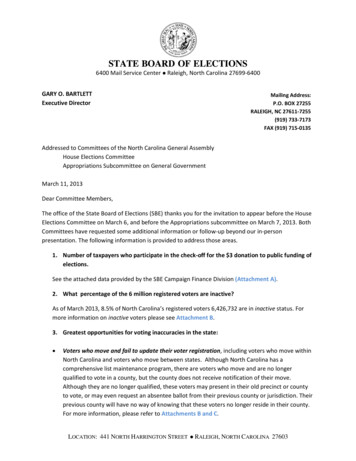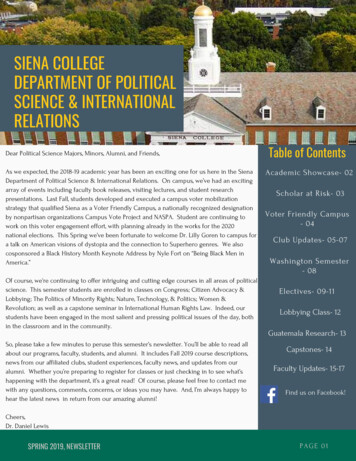
Transcription
SIENA COLLEGEDEPARTMENT OF POLITICALSCIENCE & INTERNATIONALRELATIONSDear Political Science Majors, Minors, Alumni, and Friends,As we expected, the 2018-19 academic year has been an exciting one for us here in the SienaDepartment of Political Science & International Relations. On campus, we’ve had an excitingarray of events including faculty book releases, visiting lectures, and student researchpresentations. Last Fall, students developed and executed a campus voter mobilizationstrategy that qualified Siena as a Voter Friendly Campus, a nationally recognized designation,by nonpartisan organizations Campus Vote Project and NASPA. Student are continuing towork on this voter engagement effort, with planning already in the works for the 2020national elections. This Spring we’ve been fortunate to welcome Dr. Lilly Goren to campus fora talk on American visions of dystopia and the connection to Superhero genres. We alsocosponsored a Black History Month Keynote Address by Nyle Fort on “Being Black Men inAmerica.”Of course, we're continuing to offer intriguing and cutting edge courses in all areas of politicalscience. This semester students are enrolled in classes on Congress; Citizen Advocacy &Lobbying; The Politics of Minority Rights; Nature, Technology, & Politics; Women &Revolution; as well as a capstone seminar in International Human Rights Law. Indeed, ourstudents have been engaged in the most salient and pressing political issues of the day, bothin the classroom and in the community.So, please take a few minutes to peruse this semester’s newsletter. You’ll be able to read allabout our programs, faculty, students, and alumni. It includes Fall 2019 course descriptions,news from our affiliated clubs, student experiences, faculty news, and updates from ouralumni. Whether you’re preparing to register for classes or just checking in to see what’shappening with the department, it’s a great read! Of course, please feel free to contact mewith any questions, comments, concerns, or ideas you may have. And, I’m always happy tohear the latest news in return from our amazing alumni!Table of ContentsAcademic Showcase- 02Scholar at Risk- 03Voter Friendly Campus- 04Club Updates- 05-07Washington Semester- 08Electives- 09-11Lobbying Class- 12Guatemala Research- 13Capstones- 14Faculty Updates- 15-17Find us on Facebook!Cheers,Dr. Daniel LewisSPRING 2019, NEWSLETTERPAGE 01
Academic ShowcasePolitical ScienceSchedule of EventsPlease mark your calendars and plan to join us in a celebration of ourstudents' achievements on the last Friday in April (April 26th). Theday includes a Poster/Project/Artwork Session, a wide variety oftalks given by students and faculty, and a host of honor societyinductions and award ceremonies at various locations on campusthroughout the day.SPRING 2019, NEWSLETTERPAGE 02
Siena College Scholar at Risk"Ahmed is teaching here this academic year through Scholars at Risk, an international network of colleges that hostacademics who are in danger in their home countries because of their teaching, writing or beliefs. The organization’smission is to “support and defend the principles of academic freedom and to defend the human rights of scholarsaround the world.”Ahmed, a native of the Kurdish region of Iraq, is a visiting assistant professor of political science here until May.[.]“Space is something I have been searching for most of my life,” he said. “If you don’t feel at home, you lose the abilityto speak, think, and daydream. Many refugees and women have this same experience; being constantly aware of thegaze of others deprives you of your personhood.”Ahmed emigrated for political reasons from Iraq to Canada in 2001. After earning his doctorate there, he taught inTurkey. Fired for his work with marginalized groups, he and his colleagues were persecuted for signing a petitionasking for peace. This was shortly before the 2016 coup attempt, when there was a crackdown on Kurdish people livingin the country.“We signed a petition asking for peaceful resolution, but long before that the police were watching me very closely,” hesaid. “I was very worried about my students. I still avoid contacting them.”[.]“My impression of students here is good,” he said. We’ve had good debates about a lot of topics. Generally, they aremore politically correct than previous generations, and are very careful about how they express their opinions.”[.]“There is such a sense of oppression, of ‘othering’ that is reflected in every area of university life,” he explained. “Thereis a great deal of awareness of anti-racism, anti-sexism, feminism and resistance to political oppression and studentstend to be very active in spite of the dangers they face.”[.]"As a Franciscan institution, we deeply value the pursuit of peace and justice in our learning communities,” she said.“Our students have benefited greatly from this opportunity to directly engage with Dr. Ahmed. Despite the enormousadversity he has faced, he continues to share his scholarly work with our students. He is also an activist who inspiredour majors to initiate a children's book drive for recently resettled refugees."Exerpts from The SCoop article by:Lisa WitkowskiMarch 15, 2019Read the full SCoop lar-at-risk/SPRING 2019, NEWSLETTERPAGE 03
Vote Friendly CampusJustin Kenyon ’20 and his classmates wanted to encourage political dialogue at Siena and raiseawareness of important events that impact young voters. With those goals in mind, a group led byKenyon applied for and just received the designation of Voter Friendly Campus for 2019-2020. Siena isone of only 10 colleges in New York to hold the designation.The national VFC program was started two years ago by two nonpartisan groups: Campus Vote Projectand NASPA/Student Affairs Administrators in Higher Education. The purpose? To help colleges involvetheir administrators, faculty, and student organizations in the electoral process.Kenyon, a political science major from Glenville, N.Y., learned about the program through a BonnerLeadership conference he attended last summer. When he got back to campus, he reached out toDaniel Lewis, Ph.D., chair of Siena’s political science department, saying he wanted to get thedesignation process started for Siena. “We want the campus to be a place that welcomes diverseviewpoints,” he said. “We want to increase cooperation and dialogue among the student politicalgroups, and also extend the discussion outside the political sphere.”To be named a Voter Friendly Campus, colleges must outline strategies for engaging their campus inthe electoral process, such as voter registration drives, absentee ballot requests, debates, and votingmobilization events."The students did a remarkable amount of work to connect their peers to the important issues at stakein 2018 election,” said Lewis. “They exemplify Siena's commitment to building a world that is more justthrough engagement and leadership in the community."SPRING 2019, NEWSLETTERPAGE 04
Club UpdatesPolitical Science SocietyThe Political Science Society has been busy since last fall. Aftera successful fall semester, highlighted by our Center for theStudy of Government and Politics event with CongressmenPaul Tonko and Chris Gibson, we have been busy once againthis semester. We have held two town hall debates thissemester thus far. These are monthly debates between theCollege Democrats, College Republicans, along with TurningPoint and YAL. In late February, the Society co sponsored anevent with the Black and Latino Student Union on ‘Blexit’, or themovement of black people out of the Democratic Party. Wediscussed the interrelated stereotypes of race and politicalviews. Lastly, we have held weekly meetings where we discusscurrent political topics in the news.Alumni Update:Chuck Young ‘83 is theManaging Director of PublicAffairs for US GovernmentAccountability Office (GAO),the investigative arm ofCongress. Before this currentposition, he worked as acommunications consultant,served as Chief of Staff fortwo Members of Congress,and spent 10 years as ajournalist.February 19, we, along with the Center for the Study ofGovernment and Politics, will have held a discussion withrepresentatives from the Business Council of New York and theHealthcare Association of New York State. We will discuss waysto move New York forward with the larger businesscommunity. We will host an additional town hall debate inApril, along with additional weekly meetings and poli-chats ofpolitical issues of the week. Looking forwards to next year, weare in the planning stages of organizing another trip toWashington D.C. Stay tuned! - Tyler Del GiudiceSPRING 2019, NEWSLETTERPAGE 05
Club UpdatesPre-Law SocietyThe Pre-Law Society hopes to provide a platform for its members to discuss current issues, learn aboutthe legal profession, and find opportunities for growth personally and professionally. This semester,we have had discussions on the Electoral College and the legalization of marijuana, which haveallowed students to discuss the various viewpoints on the issues and to learn about the history andcurrent events related to the topics. We have also held our 3rd annual Women’s Panel on Law andGovernment and the panel included a current second year Albany Law student, a personal injurylawyer, the president of JAI Advantage, and the Dean of Western New England Law School. Ourstudents were able to talk with the panelists and also listen to them discuss the challenges of being awoman in a male dominated field. We regularly hold LSAT Study Groups where students can comejoin us to practice questions to become better prepared for the LSAT exam. And, our final event inApril will be a discussion on campaign finance and it will allow our students to learn more about theissue while also expressing their perspectives. We are looking forward to more exciting andinformational events next year. - Dana WakemanSPRING 2019, NEWSLETTERPAGE 06
Club UpdatesMock-Trial TeamThe Siena College Moot Court/Mock Trial Team is a competition team through the American Mock TrialAssociation. Each year, the team receives a case that we prepare for trial. We have students who playattorney and witness roles. With the guidance of our coaches, who are practicing attorneys and judges, weprepare a case for the defense and the prosecution or plaintiff depending on if it is a criminal or a civil case.The team diligently worked toward gaining as much experience as they could before Regionals. In order toprepare ourselves, we competed in scrimmages against SUNY Albany, St. Rose, Williams College as well asSUNY OneontaThe Siena College Moot Court/Mock Trial team competed at Princeton University for our RegionalCompetition in 2019. We competed against Brandeis University, Amherst College, Ursinus College, as well asa bye-buster team.Mock Trial provides real world skills even for students who are not interested in going to law school.Students learn critical thinking skills, how to think quickly, analyze materials, and make a proper argumentagainst an adversary. Student's public speaking skills improve drastically from first day of tryouts to the lastcompetition of the season. These are skills students are able to use in the classroom and beyond. No matterwhat career path a student chooses, he or she will have to advocate for their argument at some point, andmock trial gives students the skills to do so.If students are interested in learning more about our program, they should reach out to Dr. Cutler atcutler@siena.edu. We look forward to meeting new potential members and expanding our team!- Jenna JewellSPRING 2019, NEWSLETTERPAGE 07
Washington Semester ProgramMy experience 1BY PAUL MORRISONTo create engaging content for your newsletter, it’s bestto review your recent accomplishments as a church.Pastors and other officials can also use it as an avenue toreach out to churchgoers. Maintain a visible presence inyour community and address people on a more personallevel, perhaps by sending a spiritual message orreflection for the week.My experience 2Looking for more ideas? You’re free to gather importantinformation from various sources. Interview parishionersand feature them on your newsletter to involve differentmembers of the community. How about talking to thedifferent sectors that make up your church, such as thechoir and the youth groups? Take photos or ask themabout their latest events. Announce bake sales andcharity drives. There are plenty of possibilities, especiallywhen you ask your community to contribute their ideas.Consider your distribution methods too. If you decide onprint, you can hand out your newsletter after Sundayservice. However, going digital will give you a widerreach and provide you with more opportunities to getfeedback. When you’re done, review your newsletter andmake revisions if necessary.SPRING 2019, NEWSLETTERPAGE 02
Fall 2019 ElectivesPOSC 329 (Special Topics in American Politics): American PoliticalDevelopmentPROFESSOR JACK D. COLLENSThe field of American political development is a tricky one in political science. Some scholarsassert that it is essentially a glorified form of political history, while others view it as a method ofinquiry rather than a substantive field unto itself. In this course, we will treat it as both asubstantive and methodological field. We will trace the complex history of American politics andhow we ended up where we are today. The semester will begin with the colonial and Foundingeras, focusing on the establishment of the American political order. We will then examine theinterwoven histories of the politics of slavery, the development of mass parties, the creation of aburgeoning American political culture, and the growth of the federal government. We will thenexamine the development of key formal and informal institutions of American politics. Theremainder of the semester will focus on the development of the politics surrounding socialmovements in America, through examination of the temperance and Prohibition movements, therise of organized labor, the fight for women’s suffrage, the civil rights movement, and intomodern debates over LGBT rights and criminal justice reform. (APJ track)POSC 265: Public PolicyPROFESSOR JESSICA PIDGEONThis course is a survey of the field of public policy, with a particular emphasis on public policyevaluation and analysis. It will cover both theoretical perspectives and practical skills relevant tocareers in public policy, public administration, community development, and politics. The coursematerial will not focus on any particular policy areas (e.g., education policy), but students will beimmersed in a specific policy area of their choice through the course assignments. The course isrequired for all Community Policy Institute (CPI) Student Fellows. (APJ and PPA tracks)SPRING 2019, NEWSLETTERPAGE 09
Fall 2019 ElectivesPOSC 235: Russia and Post-Communist PoliticsPROFESSOR AUSRA PARKWe will study political changes, institutions, and current challenges (political, economic, andsocial) of the 15 post-Soviet Republics that were once part of the Soviet empire. We will beginwith Russia; then move on to the five Central Asian “stans” (Kazakhstan, Kyrgyzstan,Uzbekistan, Tajikistan, and Turkmenistan); then the three Caucasus republics (Georgia,Armenia, and Azerbaijan--NOTE: in the spring of 2020 a travel course to this region will beoffered as a new elective!); then Ukraine, Moldova and Belarus, and wrap up with the amazingsuccess stories in political and economic development--the three Baltic States (Estonia,Latvia, and Lithuania)--which after the breakup of the ex-USSR, transformed so rapidly andsuccessfully that they became members of the European Union and NATO in 2004. Thiscourse will be a true eye-opener to those who are interested in the post-communist regionand its astounding diversity. (IR track)POSC 349 (Special Topic in Comparative Politics): Popular ProtestPROFESSOR VERA ECCARIUS-KELLYThis course explores a variety of socio-cultural and political grassroots movements throughout NorthAmerica, Europe, Latin America and the Middle East to examine the role of civil society in the publicsphere. The focus will be on how young people use popular protests to advance democratization. Ourdiscussions begin with clarifying the conceptual and definitional issues surrounding notions of civilsociety in the public sphere. We then examine the causes for the rise of civic associations, thetransformation of mass media, the impact of the Internet, and popular protest activities since the endof the Cold War in 1991. Our goal is to understand the rise of civil society and its role indemocratization in a variety of countries.This course provides a deep understanding of social science theories, concepts, and introducesmethodologies for analyzing civil society, the public sphere, and social movements. To help studentsdevelop strong analytical and writing skills, this course requires intensive class discussions andwriting exercises. (IR and APJ tracks)SPRING 2019, NEWSLETTERPAGE 10
Fall 2019 ElectivesPOSC 374: Introduction to Criminal LawPROFESSORS LEONARD CUTLER AND VINCENT BONVENTRE (2 SECTIONS)It is probably a truism to suggest that the criminal justice system in the United States today isundergoing profound change. Many states, including New York, have revised and enactednew codes to apply to the most recent trends. It is very important to note, however, that theresulting statutory approaches are characterized by diversity rather than uniformity. Thissemester a major focus of the course will provide a basis for understanding the distinctvariation in the legal concepts and why state legislatures, and the United States Congresshave been moved to make changes. Specific areas of examination will include offensesagainst the person (homicide, rape, the death penalty), offenses against habitation (burglary,arson), offenses against property (larceny, robbery, embezzlement, theft), and immutabilitywith respect to the commission of a criminal act. (APJ track)POSC 489: Internship in Public Service StudiesPROFESSOR LEONARD CUTLERThe course is designed to prepare and expose students to public policy making in New York State andallow them to participate in public policy formulation and execution at the state, substate and not-forprofit level. Students will serve as Public Service Interns 120 to 150 hours during the semesterperforming duties and responsibilities as determined by the agency supervisor in consultation withthe faculty director. Students will be graded based upon the joint evaluation of agency supervisor andinternship professor. (May be applied to any track with approval)* Written permission of the internship supervisor is required. Students may also apply for anindependent study, POSC 499.SPRING 2019, NEWSLETTERPAGE 11
Citizen Advocacy & Lobbying ClassThis semester, Dr. Lewis is again teaching a course on Citizen Advocacy & Lobbying. The course is a unique,applied learning experience, designed around the Educational Network for Active Civic Transformation(ENACT) model developed at Brandeis University. The course covers legislative process, lobbying theory andtactics, and grassroots advocacy, and requires students to apply these concepts to the real world by lobbyingand advocating for the passage of a bill currently being considered in the New York State Legislature.There are five teams of students advocating for a wide range of bills, including:A2153/S1952, a bill to require NYC Civil Courts documents to be provided in the native language of thelitigants;A90/S1477, bill to limit plastic straws use in restaurants;A1763, a bill to ensure that adults with mental disabilities are given necessary due process protections in thecriminal justice system;S1170, a bill to provide for opioid abuse prevention and overdose training in college housing;A1430, a bill to create Alzheimer's disease education and outreach programs for health professionals andpublic awareness campaigns.To prepare for their lobbying and advocacy efforts, the class toured the New York State Capitol and met withAssemblyman Phil Steck (D-Colonie) as well as Senator Neil Breslin (D-Albany). The students have also metwith Siena alumni working as professional lobbyists. Kathleen Digan ‘10 and Evan Sullivan ‘12 form OstroffAssociates discussed their experience working in a lobbying and government affairs firm. FormerAssemblyman Jack Quinn ‘00 discussed his experiences as a legislator and now as Northeast Director ofState Government Affairs for Sanofi, a pharmaceutical and vaccine company in Saratoga Springs. (APJ andPPA tracks)SPRING 2019, NEWSLETTERPAGE 02
2020 CapstonePOSC 497 (Capstone Seminar): The Politics of MemoryFall 2020Dr. Laurie NaranchThis course addresses the politics of memory particularly in relationship to violence, patriotism,visibility, and justice. While memory is an ordinary human faculty, it is also the site of politicalcontestation since memory is a way of articulating identity, prioritizing who or what matters andhow, and addressing in democratic societies how we can live together as equals or in theaftermath of violence. From the monuments in Washington D.C. to confederate monuments, tothe aftermath of the Holocaust, dictatorships, or civil rights struggles, this course allows for avariety of methodologies and topics both domestic and international especially lending itself tocase study analysis, political histories, legal and cultural analysis, qualitative research,ethnographic studies, and some survey work.POSC 497 Capstone Seminar - Global Social Justice: Human InsecuritySpring 2020Dr. Ausra ParkThis capstone seminar will focus onseveral thematic areas within the broadtopic of Global Social Justice andHuman Insecurity. These themeinclude human trafficking, poverty,access to water and food, andenvironmental consequence ofdevelopment and modernization.SPRING 2019, NEWSLETTERPAGE 13
Guatemala Research TravelFair TradeGuatemalaResearchTravel:February 23March 4,2019Conor Graham and Gloria Rosario interviewed Guatemalan artisan women who uselightweight, potable solar lanterns (Sun King Pro) in their households. The Fair Tradeand Social Justice Steering Committee provided the lanterns to Mayan communitieslast academic year. The purpose of the study was to test assertions that providingsolar lanterns to women in poor countries will have positive communal outcomessuch as increasing literacy rates among children and providing women with achance to earn additional income through their involvement in cottage industries(such as weaving, basket making, etc.)The IRB approved ethnographic study confirmed our initial findings that bothwomen and children in indigenous communities benefit from access to solartechnologies. Conor Graham and Dr. Eccarius-Kelly have applied for a SummerScholar stipend to continue to pursue their research and to jointly publish theirresults.SPRING 2019, NEWSLETTERPAGE 14
Faculty UpdatesDr. Laurie NaranchLaurie Naranch will present research at theWestern Political Science Association in SanDiego, “Craft Time, Sustainability, and PoliticalResistances.”One example comes from Guatemalawhere she travelled with Dr. Eccarius-Kelly andtwo fantastic students over February break on aresearch trip with Mayan Hands. In May she willpresent research at a specialized conference withthe University of Bologna Zone Moda conference“Be Cool!: Aesthetic Imperatives and SocialPractices in May, “Could Old Be the New Cool?:Shifting Aesthetics of the Aging Body” which willbe published in August in the Zone Modajournal.Alumni Update:Megan Blasig ‘17 is aResearch & WritingAssistant at JStrategies, a publicaffairs firm inAlbany.SPRING 2019, NEWSLETTERDr. Daniel LewisDaniel Lewis has continued to work on a largesurvey project on public opinion towardtransgender rights with his colleagues from“Team Kansas.” Current working papers include astudies of attitudes toward transgender militaryservice, athletics, and public sex-segregatedspaces such as bathrooms. The team is alsoworking on an experimental study on the effectof perspective taking in reducing transphobia.This Fall, Dr. Lewis will be on sabbatical,embarking on a new research project examininghow direct democracy institutions shape publicand political agendas in the American states.PAGE 15
Faculty UpdatesDr. Jack CollensAlumni Update:Jack Collens has begun work on a number ofinteresting research projects. First, he ispresenting work at the 2019 American ElectionsSymposium at St. Anselm College in Manchester,NH on the field of 2018 Democratic primarycandidates for the U.S. House. He is also in thebeginning stages of a book project on thepolitical response to the opioid epidemic at thefederal level. He will present early work from thisproject at the 2019 annual meeting of theAmerican Political Science Association, with thehelp of Summer Scholar Dana Wakeman (‘21).Alumni Update:Kaitlyn Krolik ‘16 isCommunications Director forBattle Born Progress, aprogressive communicationsnon-profit organization inNevada.SPRING 2019, NEWSLETTERJosh Fitzpatrick ‘94 is the Director ofCommunications and Policy for NYState Senator Daphne Jordan. Healso served as the CampaignManager and Spokesman forSenator Jordan’s successfulcampaign in 2018 and has overtwenty years of experience workingthe NY State Legislature.Dr. Len CutlerLen Cutler is working on his next volume forpublication on the Trump presidency with theworking title,President Donald Trump’s NationalSecurity:Theory Versus Practice”,and he will beundertaking a research project this summer withSummer research Scholar Gabby Agostino onTrump’s Intractable Conflict in Syria.He iscurrently supervising two Senior HonorsTheses:Shelby Davis,The HaqqaniNetwork:Success in the Shadows,and LauraDurham,Are Celebrities Able to Have a Fair Trialof A Jury of their Peers:The Cases of O.J. Simpsonand Bill Cosby.PAGE 16
Faculty UpdatesDr. Vera Eccarius-KellyVera Eccarius-Kelly is currently completing anedited volume with Peter Lang publisher titledKurdish Autonomy and U.S. Foreign Policy. Thevolume features 11 well-known Kurdish scholarswho discuss policies of continuity and change bycomparing the George W. Bush administrationand Barack Obama’s two terms with the first 24months of the Donald J. Trump administration’sinteractions with various Kurdish movements. Inaddition, Eccarius-Kelly has a chapter undercontract with Edinburgh Press that examines therole of museums in the larger MENA region(Middle East and North Africa).Eccarius-Kelly took two students (Conor Grahamand Gloria Rosario) to Guatemala over Februarybreak to continue a study on the use of solarlanterns within indigenous communities. Dr.Naranch also pursued research in Guatemalarelated to Maya women’s efforts to protect theirindigenous designs under collective intellectualproperty rights. Finally, Dr. Eccarius-Kelly will beserving as department chair during Fall semester2019.SPRING 2019, NEWSLETTERAlumni Update:Rob DeFillippo ‘17 is a ProgrammaticAnalyst working on targeted advertisingand at Starcom Worldwide, anadvertising agency in Manhattan.Dan Renwick ‘17 is a Legislative Aidefor New York State AssemblymanMichael Miller (D-Queens).Gabrielle Trieling ‘17 is JuniorAssociate at the Pace LawReview and a legal intern at theWestchester County, NY DistrictAttorney’s Office.John DiNuzzo ‘77 is AVP of CrisisManagement, Global CorporateSecurity for MetLife in Manhattan.He previously worked inemergency management for severalfinancial firms and in the New YorkState Emergency ManagementOffice.PAGE 17
Dear Political Science Majors, Minors, Alumni, and Friends, . Government and the panel included a current second year Albany Law student, a personal injury lawyer, the president of JAI Advantage, and the Dean of Western New England Law School. . SUNY Oneonta The Siena College Moot Court/Mock Tr
